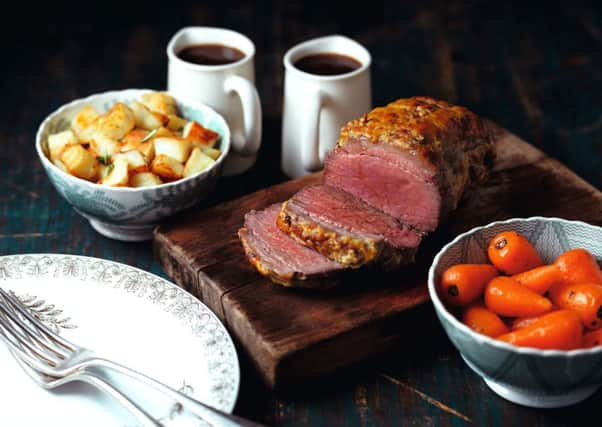Comment: Go mini for a month


As a county blessed with superb grassland, Yorkshire is famed for its beef production, so we have been asking what’s to be done. Surely we can’t give up on our traditional roast without a fight? And as a local member of the national group Ladies in Beef, I’m especially keen to tackle the problem.
Keeping a vibrant beef sector is important not only to ensure a quality, fully traceable food supply for the future, but to manage the beautiful countryside on which our local tourism industry depends – cattle perform a very useful function helping maintain our world-famous landscapes.
Advertisement
Hide AdAdvertisement
Hide AdAfter months of work, it seems that the answer could lie with a bit of lateral thinking. If people don’t have the time to devote to a big roast joint or don’t have so many big family gatherings, then let’s adapt with some brand new cuts to tempt back roast lovers.
Let’s remind people what our grandmothers knew well – that a roast can provide not just a delicious hot meal one day but thereafter a great ingredient for all sorts of hot and cold dishes that are easy to prepare.
The result of this development work is the launch of the new ‘Midweek Mini Roast’, something that Ladies in Beef are very proud to support. The new cuts, which cover lamb and veal as well as beef, are smaller and so take less time to cook, offering greater convenience.
Hopefully a new TV advertising campaign will help raise awareness and encourage people to forget their size preconceptions. The new ads are running throughout October and from a Ladies in Beef perspective, we are challenging people to ‘Go Mini for a Month’.
Advertisement
Hide AdAdvertisement
Hide AdResearch suggests the new cuts will be popular and give people another option for midweek meals. They also offer good value for money – another important aspect when everyone is watching their spending.
The success of this initiative will be crucial for local beef producers, with the farmer’s share of the retail price of beef at its lowest for five years. We know from research carried out after the ‘Horsegate’ scandal that people want to buy and enjoy British beef. This innovation gives them a new opportunity.
Finding the new cuts should be straightforward no matter where you shop. Butchers, farmers markets and local beef producers are an obvious port of call, but you can also look out for a mini roast on supermarket shelves, with Asda, Tesco and Morrisons already stocking them. Other major retailers also offer smaller joints that would work well.
To help consumers buy British with confidence in supermarkets, Ladies in Beef has produced a shopper’s guide designed to cut through what can be a bewildering selection of meat products, logos and product claims. The guide aims to help shoppers recognise and understand different messages on labels, highlighting what to look out for and common pitfalls such as multi-buys where packs of British and imported beef may be stocked together. This guide is available to download online. Simply go to www.ladiesinbeef.org.uk.
Nicola Duggleby is a Pedigree Belted Galloway beef producer from Beswick Hall Farms near Beverley.